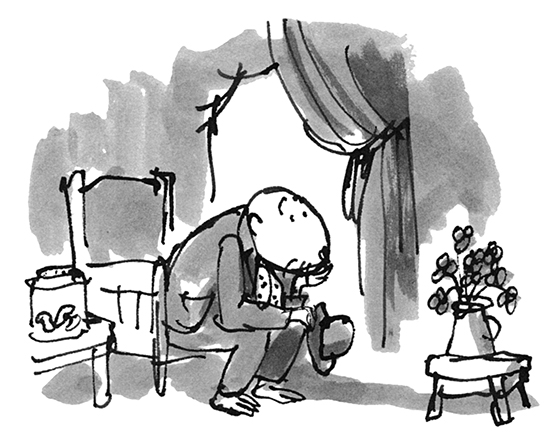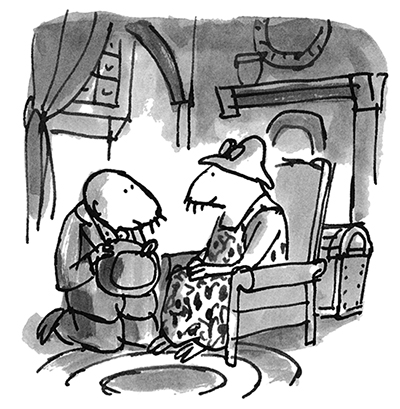
Later, when Fred returned from walking Phoebe home, his beloved burrow seemed so empty that he had half a mind to go back to the big stump. But the babies had been squalling when they got there and he knew she would be busy feeding them. She’d said she would be busy all week—till Sunday, their next date.
Fred’s days had always been solitary, but that week, for the first time, they were lonely. Instead of eating his clover, he would just gaze at it, thinking how he and Phoebe both preferred it to grass. Outdoors, instead of foraging for food, he would stare at rabbits, thinking how he and Phoebe shared a low opinion of them, or stand downwind of lilac bushes, inhaling the fragrance they both liked. Instead of sleeping at night, he would lie there marveling at how they’d both woken up from their hibernation at the same time on the same day. When, toward the end of the week, a storm kicked up and blew a strip of birch bark down into his living room, he hung it on his bedroom wall instead of tossing it out, a tribute to Phoebe’s love of birches.

On Saturday the storm system brought heavy rains, and though his burrow was as watertight as ever, Fred was miserable, afraid the rain might keep up and ruin their date. When he woke the next morning, he rushed to his doorway without even making his bed. Thank goodness! The clouds had vanished overnight. The sun was back, and the world looked newer and more radiant than he’d ever seen it.
He crossed the fir an hour earlier than last week, this time carrying a purple violet. To his inexpressible joy, he saw that Phoebe was early, too, already waiting outside her burrow.
“How lovely,” she said, taking the flower.
“Not half as lovely as you,” he said, surprising himself.
Phoebe was surprised, too. She was used to creatures mooning over Babette’s beauty, but not hers. And Fred was such a polite, respectable, good-looking woodchuck. “What a nice thing to say,” she said. “But . . . have you lost weight?”
“I was a little off my food this week.”
“You weren’t sick, I hope.”
“No, it’s just . . . I missed you, Phoebe.”
“You did?”
“Very much.”
She studied the violet. The twins had had spring colds most of the week and she’d been run ragged taking care of them, but having today to look forward to had made it all a breeze. “I missed you, too, Fred,” she said.
Just like that, Fred’s absent appetite came rushing back. After leaving the violet on her mother’s grave, they headed for his burrow and he fixed them Sunday dinner.
“I guess your digestion’s improved,” Phoebe remarked after he cleared the table.
Fred had finished off six snails and two bundles of clover. “I made a pig of myself,” he said, embarrassed.
“A whistle pig,” she said, smiling. “Don’t you hate it when they call us that?”
“I can’t stand it. Or groundhogs.”
“I know. As if we all like to dig in the ground.”
“Do you hate digging as much as I do?”
“I can’t bear it. You can’t get your paws clean for days.”
“And don’t you hate that stupid tongue twister about how much wood could a woodchuck chuck?”
“Gosh, yes, it’s horrid. The only thing it’s good for is teaching babies to talk.” She smiled. “Pretty soon I suppose I’ll have to try it on the twins.”
“They don’t talk yet?”
“Good heavens, no—they’re too young. Couldn’t you tell?”
“I don’t know very much about children.”
“But you like them, don’t you?”
“Frankly, no.”
“I bet you just don’t know any.”
“Exactly how I’d like to keep it.”
Fred’s crusty tone made Phoebe smile. She’d heard about bachelors pretending to dislike kids—till they got married and had some of their own.
“Speaking of which,” he went on, “don’t you think it would be better for those kids if your sister played a bigger role in their upbringing? She is their mother.”
“Well, you may be right, but it isn’t likely to happen anytime soon. Babs enjoys getting out and about too much.”
“It would happen if you weren’t around.”
“True. But as far as I know, I’m quite healthy.”
“I didn’t mean dying! I meant—if you didn’t live there anymore.”
“But it’s my home.”
Fred took a deep breath. By asking for her paw he would be sacrificing his blessed solitude, but Phoebe seemed so tidy, and soft-spoken, and so appreciative of his burrow. Surely she wouldn’t disrupt his peace and quiet too much. And he couldn’t remember a moment since meeting her when they hadn’t been perfectly in tune—unless it was when she got gooey about those kids. And even that wasn’t really a mark against her. There was a considerable distance—and a stream—between his burrow and theirs. And besides, if she could be so patient with dirty, noisy brats who weren’t even hers, he could only imagine how loving she would be to her own husband.
“You know, Phoebe,” he said. “I was thinking you might come and live here.”
“Here!”
They were sitting in his inherited chairs. Fred got out of his and knelt in front of her. “As my wife. Could you conceive of doing me such an honor?”

Phoebe wasn’t caught completely off guard. Things had seemed to be heading in this direction. And though she did worry about the kids, about how well Babette would make out raising them on her own, she knew it was time for her to start a life and family of her own. She and Fred seemed perfectly suited to each other, and this old-fashioned proposal touched her deeply. Nothing could have been more flattering than having a woodchuck with such neat and formal habits kneel on the floor this way.
“Yes, I could conceive of it,” she said, looking into his eyes. “In fact, I think the honor would be mine.”
Hearing this, Fred felt just the way the world had looked that morning: fresh and new. He stood up and dusted himself off. Phoebe stood as well and, smiling her bright smile, opened her arms. But hugging mussed your fur terribly, so Fred opted for sitting down on the sofa and patting the place beside him.
After a confused moment, Phoebe sat, too.
“You’ve made me a very happy woodchuck, Phoebe.”
So saying, Fred put an arm around her, just as the fat, ugly human being he’d seen from the tree had put an arm around his fat, ugly wife. And in a moment Phoebe leaned her head on his shoulder, just as the fat woman had leaned hers on her husband’s shoulder.
Closing his eyes, Fred saw a rainbow.